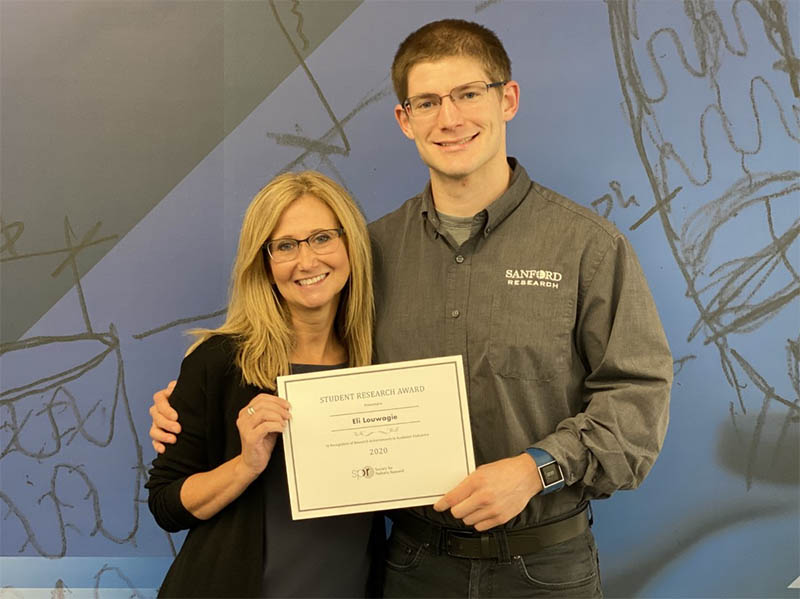When Eli Louwagie completes medical school and his residency, he’ll be a doctor who can diagnose and treat patients. But he’ll also be a doctor who, seeing the need for better medicine or diagnostics, could lead the research to come up with them.
Louwagie is working on his M.D.-Ph.D. degree through the University of South Dakota Sanford School of Medicine. After the first two years of medical school, he began working in Sanford Health neonatologist and researcher Michelle Baack’s lab at Sanford Research in Sioux Falls, South Dakota, for the Ph.D. portion of his degree. More accurately, he returned to Dr. Baack’s lab — he also had a summer internship there while attending Augustana University for his B.S. in biology.
In the lab, he investigates mitochondrial roles in heart disease programmed during development in the offspring of diabetic or obese mothers. The Baack lab uses a rat model, which Eli’s research has used to demonstrate that male offspring exposed to diabetes in utero remain at risk of heart disease in adulthood.
Louwagie’s work earned national recognition earlier this year, when he received a Student Research Award from the Society for Pediatric Research. Louwagie wrote an abstract and Dr. Baack submitted a letter of recommendation when he applied to give a platform presentation, and he was chosen for the award based on that.
He hopes to defend his Ph.D. this winter, then finish his last two years of medical school and move on to a residency.
Here, Louwagie shares a little more about his work and the good dilemma about his future plans to be a physician scientist.
Why did you decide to pursue a dual doctoral degree?
When I started college, I knew I loved medicine. And when I was in college, I started working in a couple different labs, research-wise, just loved it and really couldn’t decide between the two.
And then I found out that there’s joint programs. … You can practice medicine and see patients, and then if you do research, you can improve medicine, which just naturally fit together really well.
How has it been working in Dr. Baack’s lab?
Busy. … I’ve learned a lot. Probably the biggest thing I’ve learned to do, or I’m learning to do, is learning to think differently, or think like a scientist.
Doing research, of course there’s technical skills, doing experiments and collecting data and doing stats, things like that. But then there’s really thinking through problems and planning out experiments to answer the hard questions — thinking, what are the best ways to fully answer these questions?
More big picture scientific thinking — learning to do that better has been my biggest benefit of this. Probably the most challenging part for me also. I love the details.
What advantages will this experience give you in the future?
I’ve had a chance to do multiple yearlong projects that, from the planning to the validating, working out all the little details, even the publication process, take a lot more time than I could have done without doing the Ph.D.
Also, there’s the grant aspect. I submitted a grant, and that was a very big learning process. More writing than I would have ever imagined. In the same way, it forces me to design projects and really think them through from start to end.
How did you choose the focus of your dissertation?
All of Dr. Baack’s research projects revolve around infant health and developmental biology. … I love biochemistry and metabolism studies, and I like physiology a lot. There’s a lot of thought that goes into how the heart works and then cardiac research.
She helped me design a project that really was heavy on both those things: a lot of the physiology of how the heart works and how it can go wrong when it develops, but also one of my studies is in metabolism and how the heart uses different fuels. For the latter study, which was the focus of my award, we used mitochondrial transplants to focus on mitochondrial function in our model.
How has your research gone compared to your expectations?
I’ve been very fortunate that a lot of my stuff has worked well. A lot of times in science, stuff just doesn’t work.
What hasn’t gone how I expected is things took a lot longer than I anticipated. Like the experiments for the award project: It took a lot of months to get it all validated and all the techniques figured out. It was really worth it because our project was something no one around here was doing.
I really had to rely on what’s been published … and I reached out to other investigators at different institutions asking a lot of very technical questions.
I’m really glad I did a Ph.D. with Dr. Baack. She’s very, very dedicated and a great mentor, and she’s really pushed me a lot.
How did you feel to receive an award for your research?
Honestly, fantastic. Very validating … to have it acknowledged by a committee with scientists from all over the place.
How do you envision your future to look?
If I could run a lab while also seeing patients or practicing in the hospital, that would be ideal.
I like the idea of practicing medicine in the area of gynecologic pathology, but then also studying the different diseases I’m working on. A lot of that might move more into cancer. I’m still deciding.
More stories
- Heart research: Two lab leaders share common goal, spirit
- Research internship program attracts students nationwide
- Student pursues two careers with Sanford Research
…
Posted In Awards & Recognition, Children's, Gynecology, Heart, Postgraduate Programs, Research, Sanford Stories, Specialty Care
